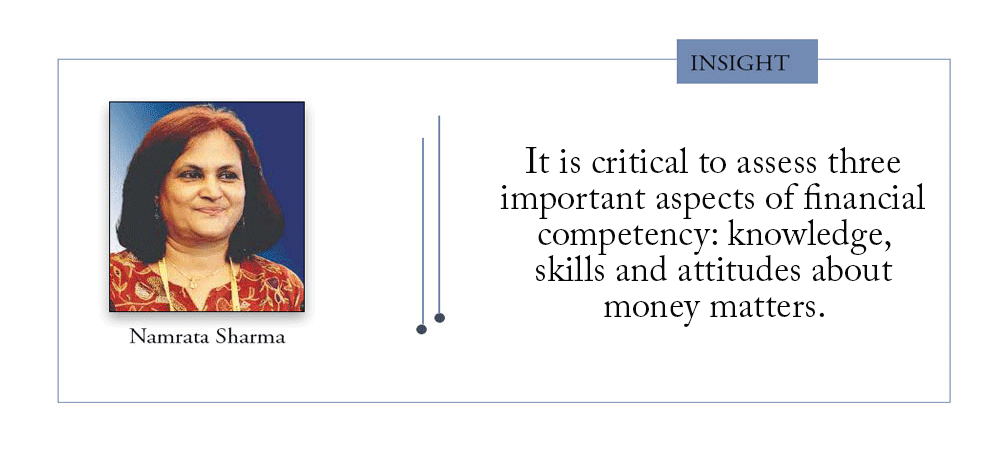- Monday, 15 December 2025
Financial Literacy Essential For All
One of the basic needs for people to lead their lives successfully is finance. There are examples where people with very meagre means prosper by increasing whatever their assets are. However, there are cases where people with large wealth holdings reach a stage where meeting their daily needs become a daily struggle. There is a need to make sure that basic education includes courses on life skills. One important life skills that all should be taught is to become financially literate. If people learn how to manage their finance, however little it may be, they will not only be able to meet their daily needs but also increase and have sufficient means for their future.
In mid-twenties, I had done a research and developed a financial literacy strategy for Nepal Rastra Bank (NRB). In Nepal, Financial Literacy (FL) is understood more as financial services and is linked with the formal financial services only. In reality, FL focuses on teaching new knowledge, skills and attitudes that people need to adopt for good money management practices for earning, spending, savings, borrowing and investing. Financial Literacy prepares individuals to use scarce financial resources more effectively and choose the financial services and products that best meet their requirements.
Informed judgements
FL is the ability to make informed judgments and effective decisions regarding the use and management of money. FL develops partly through financial experience so it is inherent in most people’s lives. However, low income people often find themselves unfamiliar with the new and rapidly changing array of financial instruments available to them and lack information about the terms and conditions of these new products. Their knowledge of these options and their ability to make informed decisions are limited. Financial capability places FL and financial education in the context of the real world choices. It implies that given information and opportunities regarding financial services and resources, people have the ability to make informed financial decisions. Financial capabilities focus on changing behaviours in addition to increasing financial knowledge or financial literacy.
In order to understand financial behaviours and overall financial literacy, it is critical to assess three important aspects of financial competency: knowledge, skills and attitudes about money matters. These three influence one’s behaviour with money. The ultimate goal of financial literacy is to improve and change one’s financial behaviour. For example, the knowledge about the importance of regular savings may lead to change in savings habit this is savings behaviour. Knowledge refers to individual understanding of financial terms as financial tools. Financial terms could be loan terms and conditions, different types of financial institutions and so forth.
Skills refer to individual’s ability to take actions related to money such as budgeting, making a savings plan, opening a savings account. Knowledge has to be turned into skills in order to support a change in behaviour. Attitudes refer to individual beliefs and thoughts about financial matters and ultimately financial institutions. Individuals hold strong attitudes towards financial matters, and the critical element for changed behaviour is motivation to work towards a goal. In general, the poor people in Nepal do have the basic knowledge about savings and loan. They were aware of transactions done within groups but lacked the skills to translate their own knowledge into practice.
Therefore, in order to take the best benefits from the groups and institutions serving them, the poor in Nepal need to develop and sharpen skills to enable them to meet their day-to-day needs, cope with unexpected emergencies, and take advantage of what comes their way. Apart from the traditional knowledge around saving and credit people lacked knowledge related to financial transactions. While most are knowledgeable, to some extent, about savings and loan, they lack knowledge related to other products like insurance, remittance and also diversified products related to savings and credit. Correlation of risks that could befall during their life cycle and how to mitigate that with support of insurance was found to be completely lacking.
In Nepal, currently, the microfinance (MF) sector is facing a crisis as repayment has become a problem and the NRB is trying to address this issue. This research done in the twenties had identified that many participants interviewed belonged to multiple groups. The MF industry had duplication of clients. These clients acquired some skills related mainly to savings and loan. However, the majority of them lacked the systematic way of planning, calculating and choosing the products for the purpose they required the services for. There was a general lack of skills to translate their limited knowledge of need to save and take credit to improve their livelihood.
Access to loan
Most of them just saved in the several groups with the hope of being able to access loan. They also became members of whoever came to them with the hope that they would get something in return. However, while doing so they lacked the skills to calculate the interest on saving, the stress of having to save in multiple groups, the interest on loan accessed from multiple groups together with loans from friends and family. This reflected their lack of ability to plan and develop a strategy to keep them out of indebtedness. Together with this, the skill to protect themselves from risks and prepare a safety measure of protecting themselves was lacking too.
The poor people had basic knowledge about savings, credit and to some extent about insurance and remittance but they lacked the proper literacy to help them make enlightened choices related to this. Thus duplication of the clients and their inability to invest in an informed manner and repay loans on time has had an accrued effect on the overall MF sector in the country. Rather than the clients, it is actually the policy-makers and the service provider who are to blame for this situation.
(Namrata Sharma is a journalist and women rights activist. namrata1964@yahoo.com Twitter handle: @NamrataSharmaP)
















